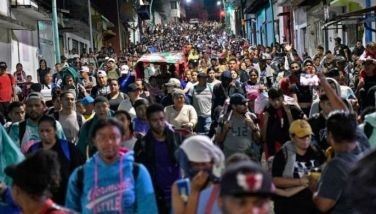How other economies are struggling as US shines
WASHINGTON — While the US economy grew from July through September at the fastest pace in more than a decade, most other major economies have been struggling.
Europe is straining just to grow. So is Brazil. Japan has slid into recession. China is trying to manage a slowdown. Russia foresees a recession next year.
Meanwhile, the US economy accelerated at a robust 5 percent annual rate last quarter.
"The US is easily top of the charts in the developed world and frankly not half-bad by (faster) emerging-market standards," said Eric Lascelles, chief economist for RBC Global Asset Management.
The United States has benefited from aggressive easy-money policies by the Federal Reserve, a banking system that rebounded from the 2008 financial crisis, solid consumer spending in areas like autos and a roaring stock market that has left many Americans feeling wealthier and more willing to spend.
Here's how other major economies stack up with the United States. The figures, compiled by RBC Global Asset Management, show third-quarter growth at an annual rate:
— EUROZONE
Up 0.6 percent. The economy of the 18 countries that use the euro currency is struggling to expand. Inflation remains alarmingly weak at 0.3 percent, and unemployment is high at 11.5 percent.
— JAPAN
Down 1.9 percent. The economy has tumbled back into recession despite easy-money policies by the Bank of Japan and aggressive spending by the government of Prime Minister Shinzo Abe. A sales tax increase in April iced what had looked like a strengthening recovery.
— FRANCE
Up 1.1 percent. The economy grew faster than expected from July through September, helped by increased government spending and stronger exports. Still, unemployment is stuck at a high 10.5 percent.
— GERMANY
Up 0.3 percent. One of the developed world's largest economies has slowed sharply the past two years as the entire European economy sputtered. In the July-September period, Germany managed to dodge a recession, helped by stronger-than-expected consumer spending.
— ITALY
Down 0.6 percent. One of the weakest of the 18 countries in the eurozone, Italy has been burdened by high debt and unemployment. Standard & Poor's this month slashed the country's credit rating to one notch above "junk" status.
— RUSSIA
Up 0.1 percent. The economy, which is expected to slide into recession, has been hammered by falling oil prices and by Western sanctions meant to punish Russia for its takeover of Crimea and assistance to rebels in eastern Ukraine.
— BRAZIL
Up 0.3 percent. The economy pulled out of recession in the July-September period, but just barely. Busier factories helped snap two straight quarters of negative growth.
— UNITED KINGDOM
Up 2.7 percent. Consumer spending has driven growth, but paltry wage increases have raised doubts about whether the spending is sustainable.
— CHINA
Up 8.1 percent. The economic growth looks impressive — until you look at its recent history. For much of the 2000s, the Chinese economy registered double-digit annual growth. Beijing is trying to engineer a delicate transition from overreliance on exports and investments in factories, roads and real estate to sturdier but slower growth based on spending by Chinese consumers.
— CANADA
Up 2.8 percent. Canadian factories were busier in the third quarter, and home-building was strong. Oil production rose, though the energy boom likely won't last given the collapse in world oil prices.
- Latest
- Trending
































